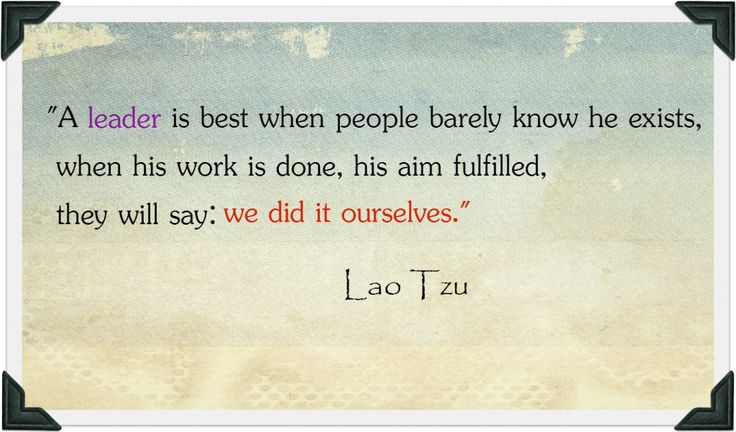
After 30 years of working, reading and studying the topic of manager’s development the quote above is still my favorite when it comes time to characterize how managers need “to be” as they perform their roles. The great Chinese philosopher Lao Tzu advised that the fundamental character of a “good manager” (He actually said leader but please allow me the poetic license!) is one of making a contribution or adding value while being invisible (e.g., transparent, transmutable and permeable).
Not being noticed! This may be a tough concept to digest, especially if you are uncertain of your own vision as a manager, are constantly spoken to about “your numbers” like you actually meet them, or you have a personal need to be in charge. I struggled with all of this myself for a long time, especially needing to be in charge. It took me a while to realize that a personal need of mine did not qualify me as a manager!
For some of us, this image of the manager as invisible presents a paradox as we think about a) contributing and b) while not being noticed. Perhaps our greatest fears are associated with not being viewed as valuable or important, as though it is us who needs to be valuable rather than value being produced is the objective.
What if as you pursue your role as manager your unexamined motives have you become visible, in fulfillment of personal rather than organizational needs. You may now be “in the way,”,a limit to what can be accomplished; you are the narrow spot in the road, the lid on the jar and very likely a bit of a pain in the arse and not just to others but yourself as well. If you make the role about you, you are apparent in ways that detract from the production of value.
If you yield to any of the following fears you are probably more visible than necessary and getting in the way:
- an unwillingness to trust others work completely
- an unwillingness to give up control
- an unwillingness to depend on others
- an unwillingness to not seem always buried with work.
- an unwillingness to not be viewed as “in the know.”
- an unwillingness to let go of today and focus on “the future” or even be freed up to do so.
Consider these words from Scott Adams, the creator of Dilbert, “…The primary job of the manager is not to empower, it is to remove obstacles.” It will be pretty hard to be focused on removing obstacles if you are constantly yielding to one of the fears mentioned above. Truthfully, you may be so fearfully occupied in the present that you don’t see the potholes in the road ahead.
The best way to become transparent, transmutable and permeable is to become obsessively interested in the future. Become intensely knowledgeable of how the business will likely profit in the future, focus on how the work being done around you will affect that future profitability and notice what obstacles you can observe and intentionally remove in service of the mutually important objectives of employee, client and shareholder satisfaction. What can you see about the way your company has always done things that might no longer be creating value? You cannot see these things from the present, you must move to a future focused perspective and when you do you’ll disappear. But don’t worry; it will probably be a relief to a lot of people and who knows, you may find you like your new found invisibility as well.
I ask you to consider that if you are a manager your greatest contribution might be made while not being noticed.
- What could you let go of today and get out of the way?
- Where is there an immediate opportunity to remove an obstacle?
Mike Cook works to create long term educational practices for middle managers through the AMJ group. He is also a Group Chair for Vistage International.

0 comments